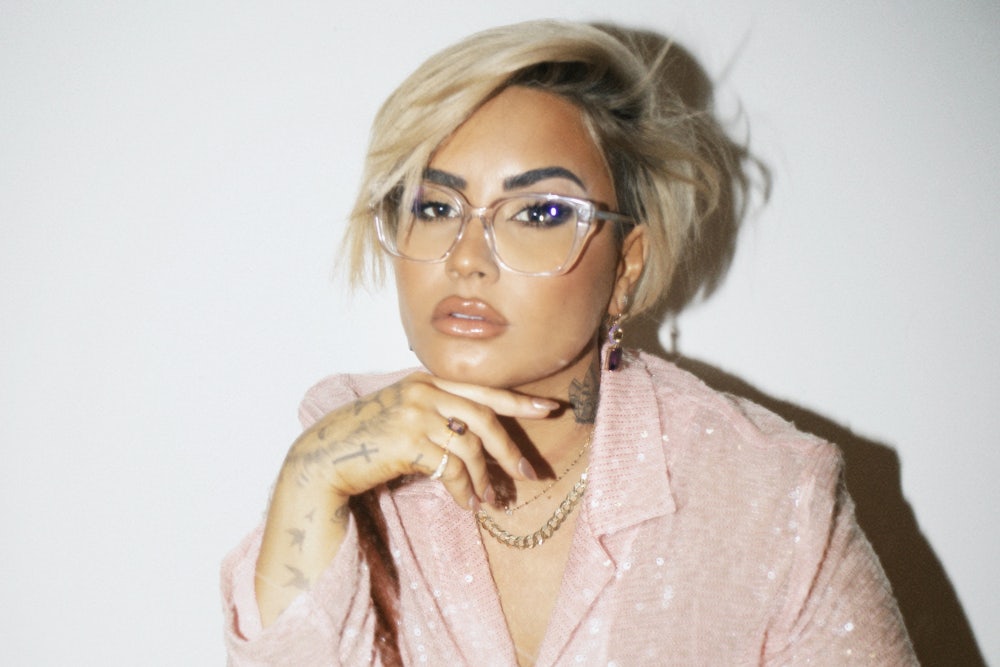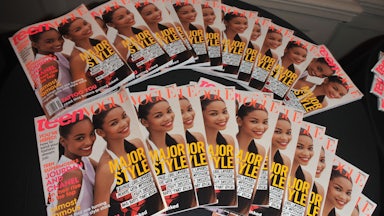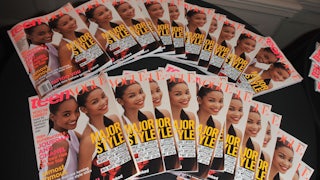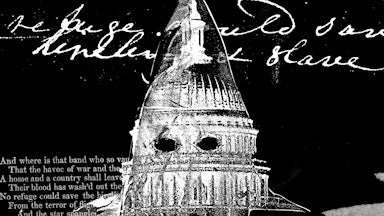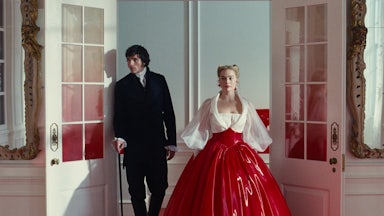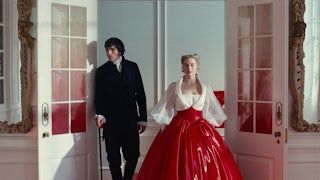In the new docuseries Dancing With the Devil: The Art of Starting Over, which airs on Demi Lovato’s YouTube channel today and precedes the release of her new album on April 2, the singer and actor recounts her narrow survival of her adolescence and young adulthood. This is the former child star’s bid for control of her reputation following a near-fatal drug overdose in 2018, which caused multiple strokes, a heart attack, and brain damage that continues to affect her vision. Her friends also appear in the documentary to describe years of eating disorders, mental health issues, and more drug abuse.
By the end, you’ve no choice but to adore her. Dancing With the Devil demonstrates a virtuosic understanding of how reputation works in our weird new world of celebrity news, where relatability—not exclusive information—is the key to commanding an audience.
Lovato, now 28, is astonishingly fresh-faced, considering she is almost two decades deep into a career of global fame. She began on Barney and Friends at the age of 10, in 2002, and worked for the next eight years on various Disney titles, including the Camp Rock series and Sonny With a Chance, before entering rehab for the first time at 18. Lovato retains the charismatic smile she brought to all those roles, and the sultry vibe that characterizes the bisexual party anthems she released in her post-Disney act as a singer, “Cool for the Summer” (2015) and “Sorry Not Sorry” (2017).
She is matter-of-fact about her drug problem. After her first rehab stint, she explains, Lovato was sober for years before deciding to experiment with drinking and smoking again. She kept her escalating drug use a secret from friends. The stakes feel horribly high: Many other charismatic celebrities, like Prince, Tom Petty, Lil Peep, and Mac Miller, have died of overdoses involving fentanyl in recent years, and Lovato almost did, too. Her former assistant Jordan Jackson recounts calling 911 on the night a drug dealer left a blue Lovato for dead in her bedroom. When she woke up in the hospital, Lovato recalls, her vision was so altered that she couldn’t recognize her sister at her bedside.
The celebrity talking heads who endorse Lovato’s comeback include Elton John; her predecessor in power-vocal pop Christina Aguilera; and Will Ferrell, whose 2020 film Eurovision Song Contest: The Story of Fire Saga she appeared in—her first acting work after the O.D. Lovato’s new manager, Scooter Braun—the impresario notorious for feuding with Taylor Swift and launching Justin Bieber—also makes an appearance. They all testify to Lovato’s bravery in asking for help and her indomitable spirit. On the question of whether she’s fully recovered—Lovato now drinks in moderation and is “getting into weed,” as her best friend puts it—only Elton John is skeptical. “Moderation doesn’t work,” he says. “Sorry!”
Amid the true confessions and matching, tie-dyed sweatsuits, Lovato discloses a shattering event: “I lost my virginity in a rape,” she says. She was 15, working for Disney at the time. The perpetrator was another actor, whom she does not name. She told an adult, she says, but nothing happened, and the two actors had to continue working together. “My #MeToo story,” Lovato says, “is me telling somebody that somebody did this to me, and they never got in trouble for it. They never got taken out of the movie they were in.”
The trauma of her assault was compounded by confusion, Lovato says, stemming from Disney’s insistence that its child actors maintain an image of sexual purity. She was a “little child star role model who has a promise ring,” she says, one of “that Disney crowd who publicly said they were waiting until marriage.” The image she was expected to maintain publicly was so at odds with her private experience that she couldn’t identify the encounter as rape until much later.
We have known at least since Shirley Temple’s heyday that working in entertainment as a child can be psychologically damaging. Disney appears to have fostered a particularly mind-warping kind of gendered culture, coupling the mandatory appearance of sexual purity with an unsafe working environment. Britney Spears and Christina Aguilera were both asked whether they were virgins at press conferences, while other former Disney child stars, including Bella Thorne and Jordan Pruitt, have gone public with stories of being sexually abused during their time at the company.
Was Lovato’s case a one-off, or part of a systemic problem? Sexual abuse will always be an issue for a company that courts children, either as performers or members of an audience. It seems odd that Disney—a company that trades in paid images of children and has devoted a peculiar amount of energy to branding its stars as virginal—has never taken any kind of formal responsibility for apparently failing to safeguard people like Lovato from sexual abuse.
Lovato is now swinging hard at Disney in the court of public opinion. She could probably only have done it now: Dancing With the Devil is a portrait of a talented addict struggling with the kind of trauma-driven behaviors that the media has only very recently adapted to sympathizing with instead of vilifying. Her revelations come at the peak of a culture change in the way we talk about female celebrities previously shamed by the media.
Since the #FreeBritney story escalated into a New York Times documentary earlier this year, various outlets have been repenting of mocking young women when they break down. The very same type of tabloid—the Daily Mail, say—that once would harvest disdain-clicks about Spears are now running stories about how terrible her persecution was. “Howard Stern admits he now supports the Free Britney movement … despite years of poking fun at Britney Spears and calling her a train wreck,” one typical headline ran.
Despite the friendly media environment, Lovato has certainly taken some risks here. She’s candid about having done heroin since her overdose, for example, while one guest even notes that she’s an excellent liar. Aware of all these dynamics, however, Dancing With the Devil pitches its message just right, blending its star’s emotional vulnerability with pristine, sculptured make-up looks and lots of teen-friendly rhetoric about finding yourself. In the final episode, Lovato gets a short, excellent haircut in affirmation of her queerness, in a staged metamorphosis scene to match Disney’s finest.
If that sounds cynical, consider the shifting landscape of Hollywood news these days. Celebrities drip-feed curated images to their fans via Instagram, controlling their reputations tightly. Meanwhile, there are few gossip rags claiming their First Amendment rights to defame prominent people anymore. Instead, the “free speech” beat now seems to be occupied by a whiney strain of anti–“cancel culture” conservatism, one that is not bringing celebrity reporting to the table.
Invasive coverage of celebrities’ private lives now seems so tacky that the modern audience prefers to get its information, even if biased, straight from the source rather than via critical third parties. Dancing With the Devil shows Lovato speaking the words “Disney” and “rape” together in footage that millions will see—itself a remarkable achievement. Time for entertainment’s most hulking behemoth to learn a thing or two about controlling the narrative, it seems, from one of its own.
